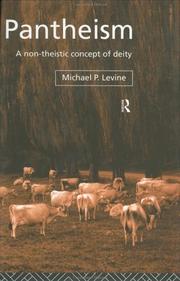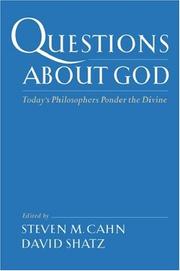| Listing 1 - 10 of 28 | << page >> |
Sort by
|
Book
ISBN: 0199989907 0199989915 0199989893 9780199989911 9780199352326 0199352321 9780199989898 9780199989904 Year: 2013 Publisher: New York
Abstract | Keywords | Export | Availability | Bookmark
 Loading...
Loading...Choose an application
- Reference Manager
- EndNote
- RefWorks (Direct export to RefWorks)
Loriliai Biernacki and Philip Clayton offer a collection of groundbreaking new essays on panentheism. Not to be confused with pantheism - the ancient Greek notion that God is everywhere - panentheism suggests that God exists both in the world and beyond the confines of mere matter.

ISBN: 1134911580 1280334215 0203014774 9780203014776 0415070643 9780415070645 9781134911530 9781134911578 9781134911585 9780415755863 1134911572 Year: 1994 Publisher: London New York Routledge
Abstract | Keywords | Export | Availability | Bookmark
 Loading...
Loading...Choose an application
- Reference Manager
- EndNote
- RefWorks (Direct export to RefWorks)
Many people who do not believe in God believe that 'everything is God' - that everything is part of an all-inclusive divine unity. In Pantheism, this concept is presented as a legitimate position and its philosophical basis is examined. Michael Levine compares it to theism, and discusses the scope for resolving the problems inherent in theism through pantheism. He also considers the implications of pantheism in terms of practice. This book will appeal to those who study philosophy or theology. It will also be of interest to anyone who does not believe in a personal God, but does have
Pantheism. --- Philosophy --- Religion --- Panentheism
Book
Year: 2018 Publisher: New York : Peter Lang,
Abstract | Keywords | Export | Availability | Bookmark
 Loading...
Loading...Choose an application
- Reference Manager
- EndNote
- RefWorks (Direct export to RefWorks)
The book provides the first analysis of Karl Christian Friedrich Krause's system of philosophy and of his panentheism in English. It is of value to anyone interested in German idealism, panpsychism, panentheism, holism and metaphysical grounding.
Book
ISBN: 1622733851 1622732596 9781622732593 1622731484 9781622731480 Year: 2016 Publisher: Wilmington, Delaware
Abstract | Keywords | Export | Availability | Bookmark
 Loading...
Loading...Choose an application
- Reference Manager
- EndNote
- RefWorks (Direct export to RefWorks)
God --- Theism. --- Religion --- Philosophy --- Atheism --- Misotheism --- Panentheism --- Proof. --- Philosophy.
Book
ISBN: 1317491904 1315711427 1280120096 9786613523990 1844654796 9781844654796 9781317491903 1844652467 1844652475 9781844652464 9781844652471 9781315711423 9781280120091 6613523992 9781317491880 9781317491897 Year: 2011 Publisher: Durham Acumen
Abstract | Keywords | Export | Availability | Bookmark
 Loading...
Loading...Choose an application
- Reference Manager
- EndNote
- RefWorks (Direct export to RefWorks)
Are there adequate reasons to think that God exists? And, if God exists, what is God like? Jay Wood examines these two foundational questions about God, which have exercised philosophers since antiquity. The first part of the book addresses epistemological concerns, focusing on arguments for and against the claim that theism is rationally justifiable. Metaphysical questions about Gods nature, in particular Gods knowledge and power, constitute the second part of the book. Both questions are shown to be related since, if the concept of a God perfect in wisdom, power and goodness is incoherent, it cannot be reasonable to believe that God exists. Wood offers readers a clear and incisive assessment of the core philosophical arguments for the existence of God that will equip the reader with the necessary understanding to tackle more specialized and complex questions in the philosophy of religion.
God --- Theism. --- Attributes of God --- Philosophy --- Religion --- Atheism --- Misotheism --- Panentheism --- Proof. --- Attributes.
Book
ISBN: 9042025417 9786612594571 904202920X 144160653X 1282594575 9789042025417 9781441606532 9789042029200 Year: 2009 Publisher: Kenilworth Rodopi
Abstract | Keywords | Export | Availability | Bookmark
 Loading...
Loading...Choose an application
- Reference Manager
- EndNote
- RefWorks (Direct export to RefWorks)
This book discovers areas and themes, especially in philosophical psychology, for novel observations and investigations, the diversity of which is systematically unified within the frame of the author’s original metaphysics, panenmentalism. The book demonstrates how by means of truthful fictions we may detect meaningful possibilities as well as their necessary relationships that otherwise could not be discovered.
Metaphysics. --- Necessity (Philosophy). --- Observation (Psychology). --- Psychology and philosophy. --- Possibility. --- Panentheism. --- God. --- Philosophy --- Religion --- Pantheism --- Theism --- Logic --- Metaphysics --- Misotheism --- Monotheism
Book
ISBN: 1283736128 1441191712 9781441191717 9781441100306 144110030X 9781283736121 9781628926880 144116863X Year: 2013 Publisher: New York Bloomsbury
Abstract | Keywords | Export | Availability | Bookmark
 Loading...
Loading...Choose an application
- Reference Manager
- EndNote
- RefWorks (Direct export to RefWorks)
Well-Being and Theism is divided into two distinctive parts. The first part argues that desire-fulfillment welfare theories fail to capture the 'good' part of 'good for', and that objective list welfare theories fail to capture the 'for' part of 'good for'. Then, with the aim of capturing both of these parts of 'good for', a conjunctive theory-one which places both a value constraint and a desire constraint on well-being-is advanced. Lauinger then defends this proposition, which he calls the desire-perfectionism theory, against possible objections. In the second part, Lauinger explores the q
Happiness --- Well-being --- Theism. --- Philosophy --- Religion --- Atheism --- God --- Misotheism --- Panentheism --- Spiritual well-being --- Religious aspects. --- Theism --- Religious aspects
Book
ISBN: 395743730X 3957431719 Year: 2020 Publisher: Paderborn, Germany : Mentis Verlag,
Abstract | Keywords | Export | Availability | Bookmark
 Loading...
Loading...Choose an application
- Reference Manager
- EndNote
- RefWorks (Direct export to RefWorks)
Panpsychism has become a highly attractive position in the philosophy of mind. On panpsychism, both the physical and the mental are inseparable and fundamental features of reality. Panentheism has also become immensely popular in the philo-sophy of religion. Panentheism strives for a higher reconciliation of an atheistic pantheism, on which the universe itself is causa sui, and the ontological dualism of necessarily existing, eternal creator and contingent, fi nite creation. Historically and systematically, panpsychism and panentheism often went together as essential parts of an all-embracing metaphysical theory of Being. The present collection of essays analyses the relation between panpsychism and panentheism and provides critical reflections on the significance of panpsychistic and panentheistic thinking for recent debates in philosophy and theology.
Religion --- Philosophy. --- Metaphysik --- Analytische Theologie --- Weltanschauungen --- Bewusstsein --- Gott-Welt-Beziehung --- Metaphysics --- Analytic Theology --- Worldviews --- Consciousness --- God-word-relation --- Philosophy --- Panentheism. --- Philosophy and religion.

ISBN: 1280594624 9786613624451 0199760802 9780199760800 9781280594625 0195150376 9780195150377 0195150384 9780195150384 0190287772 0197740626 Year: 2023 Publisher: New York ; Oxford University Press,
Abstract | Keywords | Export | Availability | Bookmark
 Loading...
Loading...Choose an application
- Reference Manager
- EndNote
- RefWorks (Direct export to RefWorks)
Here, philosophers debate questions such as why God permits suffering or requires prayer, in a text that aims to engage both believer and non-believer.
God (Christianity) --- Theism. --- Philosophical theology. --- Philosophy, Modern --- Theology, Philosophical --- Philosophy and religion --- Theology, Doctrinal --- Philosophy --- Religion --- Atheism --- God --- Misotheism --- Panentheism --- Christianity --- Trinity --- Philosophical theology --- Theism --- God.
Book
ISBN: 9780889206687 0889206686 1554585651 1282232878 9786613810618 Year: 1986 Publisher: Waterloo, Ontario, Canada : Wilfrid Laurier University Press,
Abstract | Keywords | Export | Availability | Bookmark
 Loading...
Loading...Choose an application
- Reference Manager
- EndNote
- RefWorks (Direct export to RefWorks)
John Henry Newman's writings in theology, apologetics, history, poetry, and educational theory, among other fields, made him one of the most controversial as well as influential modern Christian thinkers. Central to his religious vision was his innovative and complex "mental philosophy," first sketched out at Oxford during his Anglican years and developed in its most detailed form in his celebrated Grammar of Assent. In The Mental Philosophy of John Henry Newman, Jay Newman (no relation) presents a careful scrutiny of John Henry Newman's phenomenology of belief and epistemology in the context of the nineteenth-century cleric's major work. He departs from traditional historical and technological approaches to Newman's work on belief and critically examines Newman's contribution in this area from the standpoint of contemporary analytical philosophy. The study examines the sources, aims, and implications of Newman's philosophical project. While it draws attention to the positive value of Newman's original approach, it also explores the weaknesses and dangers of Newman's main phenomenological and epistemological theories. Jay Newman not only makes a significant original contribution to the field of Newman studies but also provides us with a guide to some of the problems and confusions of the Grammar of Assent.
Faith. --- Theism. --- Philosophy --- Religion --- Atheism --- God --- Misotheism --- Panentheism --- Religious belief --- Theological belief --- Belief and doubt --- Salvation --- Theological virtues --- Trust in God --- Newman, John Henry,
| Listing 1 - 10 of 28 | << page >> |
Sort by
|

 Search
Search Feedback
Feedback About UniCat
About UniCat  Help
Help News
News